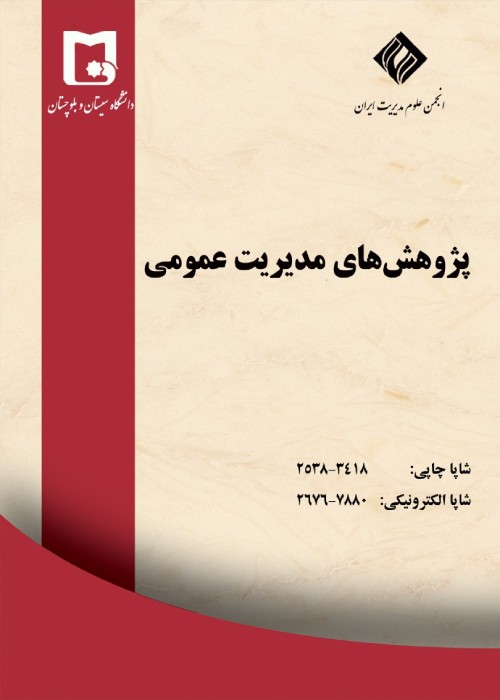Structural Equation Modeling of the Relationship between Emotional Intelligence and Organizational Citizenship Behavior(Case Study: Employees of Imam Khomeini Hospital in Alashtar)
Author(s):
Article Type:
Research/Original Article (دارای رتبه معتبر)
Abstract:
One of the most important attributes of each organization to work in today's changing circumstances is to have people who are willing to participate in the organization's successful changes; that is, to show organizational citizenship behavior. Successful organizations are looking for employees who go beyond defined tasks and their performance is higher than expectations. The purpose of this study was investigating the relationship between emotional intelligence and organizational citizenship behavior (OCB). The statistical population consisted of employees at Imam Khomeini hospital in Alashtar and the sample size was determined using Krejcie and Morgan table. The data were collected using standard questionnaires made by Podsakoff et al. as well as Bradbury and Greaves. In order to confirm the research model, structural equation model was used and for analyzing data, AMOS 20 and SPSS 18 software were applied. The results showed that there was a significant positive correlation between emotional intelligence and OCB. Also, among the four components of emotional intelligence including self-management, social awareness, relationship management and self-awareness, the first three components are involved in predicting OCB.
Case study
The statistical population of this research included all 84 employees of Imam Khomeini Hospital in Alashtar. Based on Karjesi and Morgan's tables, 74 people were selected as the statistical sample.
Research
Discussion and
Introduction
Organizational Citizenship Behavior (OCB) is a unique, voluntary and extra-role behavior which is effective in increasing the organization performance and directly or indirectly organized by the official reward system of the organization (Danaei fard et al., 2011). Organizational citizenship behaviors are not evident in any circumstances, and some personal and organizational characteristics help to emerge and expose these behaviors (Rajab beigi et al., 2013). One of the factors that strongly affects each organizational behavior is "Emotional Intelligence". (Mohammad tabar et al., 2011). Emotional intelligence is related to the attitudes and behaviors of employees (Martinez, 1997). Health-related organizations have an important role in the social life, because their activities directly affect the lives and the property of individuals (Mahdad & Mahdizadegan, 2010). These organizations need employees who, in addition to fulfill their formal duties, provide extra-role behaviors; i.e., organizational citizenship behaviors (Rezaeian & Rahimi, 2008). considering the nature and importance of organizational citizenship behavior and emotional intelligence, we are going to evaluate the relationship between emotional intelligence and organizational citizenship behavior among the staff of Imam Khomeini Hospital in the city of Alashtar.Case study
The statistical population of this research included all 84 employees of Imam Khomeini Hospital in Alashtar. Based on Karjesi and Morgan's tables, 74 people were selected as the statistical sample.
Research
Methods
The main data collecting tool in this research is questionnaire. To measure emotional intelligence, the standard 28-question questionnaire made by Bradbury and Greaves was used. Podsakoff's standard questionnaire was applied to assess organizational citizenship behavior. To determine individuals' emotional intelligence, the mean value was calculated. Based on the equation approach and using AMOS software, research hypothesis and conceptual model were tested and evaluated.Discussion and
Results
The findings of evaluating the first hypothesis showed a significant positive correlation between emotional intelligence and OCB. In this way, the main research hypothesis was accepted. Examining the second hypothesis, results showed that with a probability of 99%, there was a significant relationship between all components of emotional intelligence and OCB. In addition, research findings indicated that self-awareness does not play a role in predicting OCB. In analyzing this finding, it should be pointed out that as a psychological variable, emotional intelligence refers to the ability to recognize and manage ones and others' emotions. In this regard, part of this variable implies interpersonal relationships and social skills that play an important role in expressing citizenship behaviors. Therefore, employees with high emotional intelligence are more effective in work environments because they interact better; and the more emotional intelligence, the more expectation to show organizational citizenship behavior, especially in terms of partnership and altruism. Emotional intelligence may increase altruistic behavior, because it allows employees to recognize and understand their colleagues' feelings and consequently provide a more appropriate response.
Conclusion
Considering extra-role behaviors such as organizational citizenship behavior as a psychological factor is so important in organizations like hospitals, which are service-oriented organizations with large amount of diverse activities. Creating an organizational citizenship behavior requires a culture based on common values. To do so, managers in hospitals need to have employees' involvement in developing organizational policies and orientations. According to the fact that components such as relationship management, self-management, and social awareness were determined as suitable predictors for OCB in this study, it is suggested to pay more attention and emphasis on these components to enhance citizenship behavior in the case studyKeywords:
Language:
Persian
Published:
Management Researches, Volume:11 Issue: 40, 2018
Pages:
187 to 214
magiran.com/p1909741
دانلود و مطالعه متن این مقاله با یکی از روشهای زیر امکان پذیر است:
اشتراک شخصی
با عضویت و پرداخت آنلاین حق اشتراک یکساله به مبلغ 1,390,000ريال میتوانید 70 عنوان مطلب دانلود کنید!
اشتراک سازمانی
به کتابخانه دانشگاه یا محل کار خود پیشنهاد کنید تا اشتراک سازمانی این پایگاه را برای دسترسی نامحدود همه کاربران به متن مطالب تهیه نمایند!
توجه!
- حق عضویت دریافتی صرف حمایت از نشریات عضو و نگهداری، تکمیل و توسعه مگیران میشود.
- پرداخت حق اشتراک و دانلود مقالات اجازه بازنشر آن در سایر رسانههای چاپی و دیجیتال را به کاربر نمیدهد.
دسترسی سراسری کاربران دانشگاه پیام نور!
اعضای هیئت علمی و دانشجویان دانشگاه پیام نور در سراسر کشور، در صورت ثبت نام با ایمیل دانشگاهی، تا پایان فروردین ماه 1403 به مقالات سایت دسترسی خواهند داشت!
In order to view content subscription is required
Personal subscription
Subscribe magiran.com for 70 € euros via PayPal and download 70 articles during a year.
Organization subscription
Please contact us to subscribe your university or library for unlimited access!


